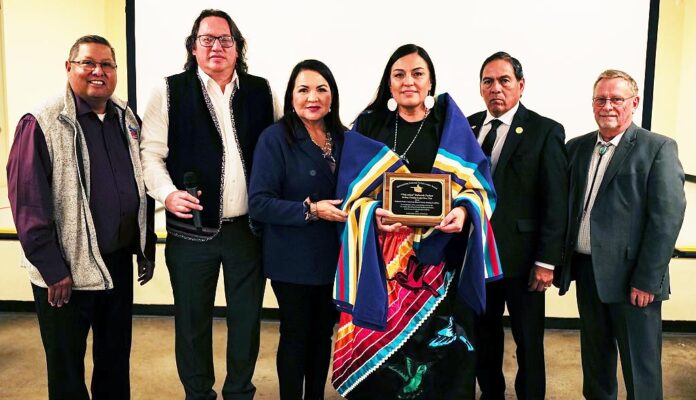
STROUD, OK – United Indian Nations of Oklahoma (UINO) recently concluded its annual meeting hosted by the Sac and Fox Nation. Changes to state and federal leadership, advocacy to pass federal legislation for a Native American Boarding School Commission, and the crisis of Missing and Murdered Indigenous People (MMIP) dominated the two-day event.
Tribal leaders, policy experts, and Native advocacy organizations tackled these critical issues in Indian Country to plan strategic action for 2025. Officers re-elected were Shawnee Chief Ben Barnes, UINO Board Chairperson; Wyandotte Nation Second Chief Norman Hildebrand, Vice Chairman; Muscogee Nation Principal Chief David Hill, Secretary; and Bruce Pratt (Pawnee), Treasurer. Margo Gray (Osage) continues to lead UINO as Executive Director.
“We dealt with some heavy issues over the past couple of days. We covered everything from the MMIP crisis to healthcare, a second Trump administration, and who will fill key positions at the Department of Interior,” said Gray. “We also discussed how new leadership in both chambers at the Oklahoma State Legislature will impact our issues. The highlight was honoring Deb Parker with the Native American Boarding School Healing Coalition. We see just how close we are to passing federal legislation that will form a commission seeking justice for survivors and families. Congress must pass this legislation before it’s too late for our elders who lived through the boarding school era.”
Annual Meeting Highlights
Federal and State Policy Priorities:
The U.S. Senate and both chambers in the Oklahoma Legislature have new leaders for the first time in several years. Attendees and panelists discussed strategies to address the legislative leadership changes and a new White House with incoming President Trump. Attorney Wilson Pipestem addressed federal leadership changes, including a Republican-controlled Senate with new Majority Leader John Thune (R-SD).
“Typically, any change in presidential leadership is never as bad as some think it will be or as good as others think it will be,” said Pipestem.
Pipestem said a rise in the power of leaders from the Great Plains region, such as Sen. Thune (South Dakota) and Department of Interior nominee Governor Doug Burgum (North Dakota), may benefit tribal relations. Pipestem and others praised Rep. Tom Cole (R-OK, Chickasaw), who remains Chair of the House Appropriations Committee, a key role for tribal interests.
The Oklahoma Legislature has new leadership in both chambers for the first time in eight years. Attorney Fred Jordan provided insight into what these changes mean for tribal interests at the state level.
Jordan acknowledged the new Mason Treat Act has created confusion regarding tribal license plates. However, he praised new Oklahoma Senate President Pro Tem designate Lonnie Paxton (R-Tuttle) and Oklahoma House of Representatives Speaker-Designate Kyle Hilbert (R-Bristow) for their willingness to consider potential legislative fixes and work together on other legislation affecting tribal interests.
National Native American Boarding School Healing Coalition (NABS):
Deborah Parker, CEO of NABS, received UINO’s National Tribal Leader of the Year award and delivered a passionate call to action on Senate Bill 1723 and House Resolution 7227, the Truth And Healing Commission On Indian Boarding School Policies Act.
Parker, along with NABS’ Director Of Policy & Advocacy Dr. Ponka-We Victors-Cozad and Board Member Chief Ben Barnes, asked attendees to contact their U.S. Senators and Representatives and urge them to send S.1723/H.R. 7227 to a floor vote before Congress swears in new members this January.
This legislation would establish a commission to seek answers on the number of Native children forced to attend government-sanctioned boarding schools, the number of Native children who were abused, died or went missing while at these institutions, and the long-term impacts on Native children and the families of children forced to attend Indian boarding schools.
The Truth And Healing Commission On Indian Boarding School Policies Act would allow the commission subpoena power to locate and analyze all records on Indian boarding schools from federal, state and local governments, churches and religious institutions, and private organizations. Records of primary importance include documents related to attendance, infirmary, deaths, land, and other correspondences.
The commission’s findings will allow them to make recommendations to Congress on achieving true reconciliation and healing for Native communities.
“NABS was able to identify at least 527 U.S. boarding schools. But our work so far is only the beginning,” said Parker. “There are millions upon millions of records that haven’t been sorted through. We know there are children across this country buried in unmarked graves. Our elders who have this shared experience are up in age. The truth-telling needs to happen so they feel like they have a voice. Our elders deserve that healing. We will not stop. A safe public and private convening needs to be held so we can make recommendations to Congress to help us find and identify our children. We will pass this bill and find those children.”
If S.1723/H.R. 7227 does not receive a floor vote before Congress swears in new lawmakers on Jan. 3, 2025, the process of hearings, testimony and passing a new bill begins all over again.
Missing and Murdered Indigenous People (MMIP):
A major focus of the second day of the annual meeting was the MMIP crisis. Two OSBI (Oklahoma State Bureau of Investigation) Special Agents, Dale Fine and Joshua Patzkowski, were joined by LaRenda Morgan, MMIP advocate and Founder/President of the Cheyenne and Arapaho Tribes’ MMIP Chapter.
The passage of Oklahoma’s Ida’s Law in 2021 helped create both Fine’s and Patzkowski’s positions at OSBI. Morgan led the effort to pass the bipartisan law, which is named after her first cousin Ida Beard, a Cheyenne and Arapaho citizen who has been missing since 2015. Morgan discussed the heartache and anguish families experience when a loved one goes missing.
“We’d never had anyone in our family go missing,” said Morgan. “People in our Indian communities don’t talk about this.”
Ida’s Law was designed to improve collaboration between tribal, state, and federal agencies in cases of missing and murdered Indigenous people. The OSBI can provide fingerprint and DNA analysis, help log information into the missing persons database or add an extra pair of eyes to a case that’s gone cold. However, the panelists all agreed that challenges still exist.
They acknowledged one of the greatest challenges is still related to jurisdiction. If local, county or tribal law enforcement receives a missing persons report, the reporting agency must formally request OSBI support before the state agency can intervene.
Special agent Fine outlined the agency’s progress in addressing MMIP cases but stressed that education and resources are tools not yet fully realized in Tribal communities. “When a young person is in an abusive relationship, we need to make sure they know there are resources available to them, and they don’t have to go back into that situation,” he said.
Fine also stated he looks forward to digging into several cold cases involving MMIP.
UINO Leadership and Awards:
UINO also celebrated outstanding contributions with the annual awards luncheon, sponsored by Sac and Fox Nation.
- National Tribal Leader of the Year: Deborah Parker from the National Native American Boarding School Healing Coalition (NABS)
- Oklahoma Tribal Leader of the Year: Mekko George Thompson for his work to save Hickory Ground in the ancestral lands of the Muscogee people
- Outstanding UINO Member: Jacque Secondine Hensley, Director for the Office of American Indians in Medicine and Science at Oklahoma State University Center for Health Sciences
“I think it’s so appropriate that one of our honorees, Mekko George Thompson, mentioned unity in his remarks,” said Shawnee Chief and UINO Chairperson Ben Barnes. “Unity sums up UINO coming together to address the issues most affecting Indian Country.”














































